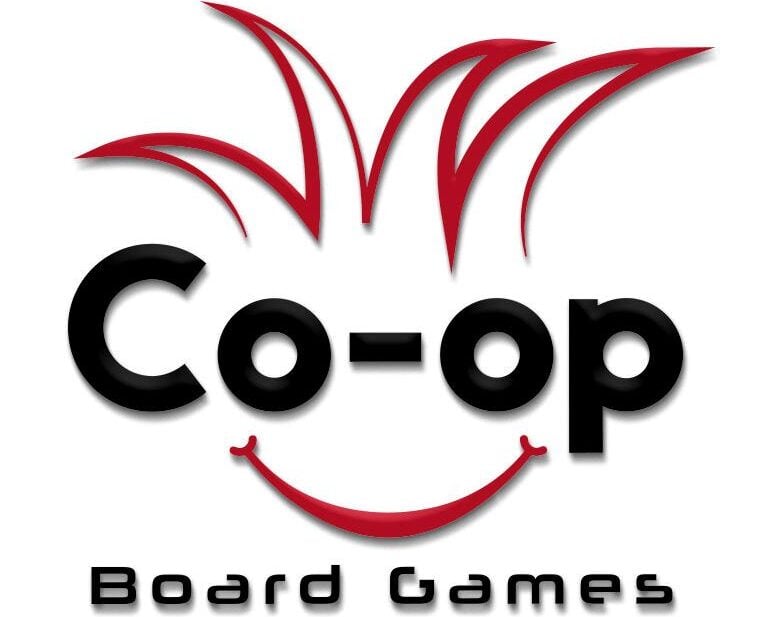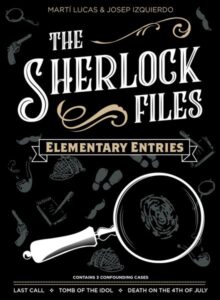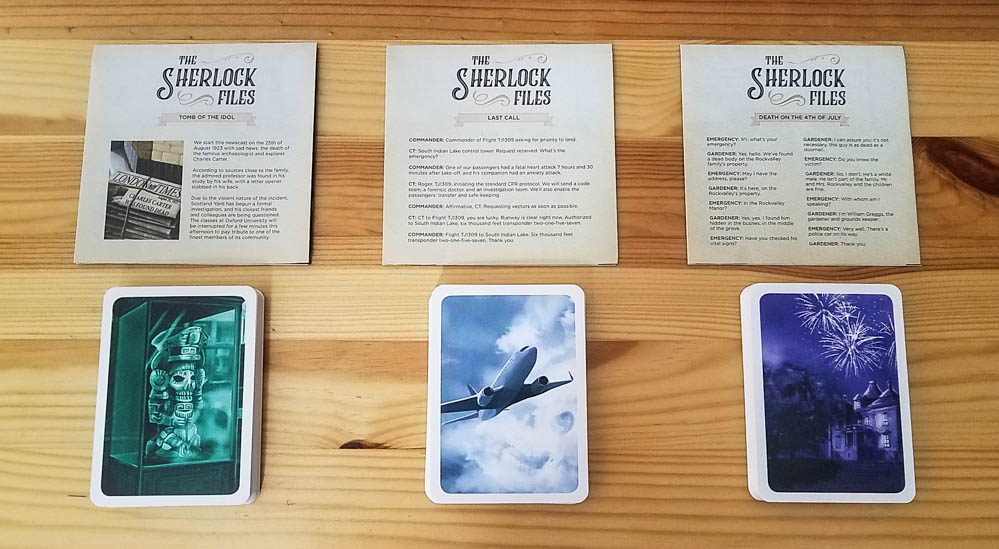The Sherlock Files: Elementary Entries Review
Year: 2019 | Players: 1-8 | Minutes: 40+ | Ages: 14+
This The Sherlock Files: Elementary Entries review was made after playing through the three cases. We were sent a copy of this game by the publisher in exchange for an honest review.
What is The Sherlock Files?
The Sherlock Files: Elementary Entries is a cooperative deduction game in which you play as detectives who need to figure out the clues that are most relevant to your case and then try to solve the case with the evidence that you gathered. The game includes three unconnected cases: Death on the 4th of July, Last Call, and The Tomb of the Archaeologist.
The Sherlock Files: Elementary Entries was designed by Francisco Gallego Arredondo, Martí Lucas Feliu, and Josep Izquierdo Sánchez, and it’s published by Indie Boards and Cards.
Rules Overview
Each case in The Sherlock Files starts with a short case introduction that you’ll read aloud. You then put the first clue card on the table, shuffle the other cards, and deal each player three cards (two cards if playing with 6+ players).
On your turn, you can either reveal a card or discard a card. Revealed cards stay face-up on the table for the rest of the game and discarded cards can never be looked at again. What you’re attempting to do is look through your hand of cards for a clue that is relevant to the case and reveal it. If you don’t have a good clue, you try to find a card that is irrelevant and discard it. After you’ve revealed or discarded a card, you draw a new one and the next player takes their turn.
There is a limit to what you can say to each other throughout the game. You can speak freely about the clue cards that have been revealed, but you’re only allowed to read the underlined or framed text on the cards in your hand. You can’t talk about the discarded clues until the end of the game.
After all of the cards have been revealed or discarded, you discuss your theories and then answer the questions in the case’s questionnaire. You score two points for the questions answered correctly and you lose a point for each revealed card that should have been discarded (irrelevant clues).
[the_ad_group id=”1052″]
Pros and Cons
Pros
- I really like this Q System. The deck is filled with potential clues and the designers have done a great job of making each one feel like it’s relevant somehow. Also, it’s pretty cool that everyone’s games are going to play out a little bit differently since there’s no set order to how the clue cards come out.
- My favorite moment in each case is at the end when you get a chance to talk about the clues you’ve discarded. It’s this fun little cooperative memory game that creates some great aha moments.
- I also like that the game doesn’t just feed you the answers. Instead, you have to deduce the solution from the clues you gather, which makes it more challenging than a lot of the other detective games out there.
- There’s a good amount of tension in The Sherlock Files. Since you can’t say very much about what’s in your hand, you feel a bit more pressure to make good decisions.
- I usually don’t like scoring systems in cooperative games, but I do like this one. It makes sense that irrelevant clues count against your score even if you did ultimately solve the case. It basically represents the amount of time you wasted during your investigation.
- Most crime-solving board games are better at lower player counts, but The Sherlock Files seems to be a good gaming experience regardless of how many people are playing.
- You can teach this game to someone in about 15 seconds. It’s definitely one of the easiest deduction board games to teach and learn.
Cons
- My group really disliked the Death on the 4th of July case. We enjoyed playing through the case, but we just couldn’t see how we could have solved it with the clues we were given and we were all pretty frustrated after reading the solution. Some people think it’s the best case of the three, though, so YMMV.
- One flaw in this system is that the order in which the clues come out can matter. It’s not uncommon for someone to discard a clue simply because they haven’t seen any other information about it yet. If you forget about that information, which definitely can happen, you can miss something huge in the case.
- This is a unique system that takes some time to get used to, so I have a feeling that some groups will struggle with their first cases. I’m surprised a quick tutorial case wasn’t included.
Final Thoughts
The cases in The Sherlock Files: Elementary Entries were hit or miss for my group – one was really good, one was pretty good, and one we didn’t like – but everyone was into each case from beginning to end, which is always a good thing. I think this Q System has a ton of potential and I’m hoping that more cases are released in the future.
While I do think other detective games like Sherlock Holmes Consulting Detective, Deadline, and Chronicles of Crime are better games overall, The Sherlock Files does have some advantages over them. It’s quicker to play, it’s arguably better at higher player counts, and there’s pretty much no chance of an alpha player taking over.
If you like deduction board games, I do recommend checking out The Sherlock Files: Elementary Entries. Even if you only end up liking two of the three cases, you will definitely feel like you got your money’s worth.
The Sherlock Files Links
BGG | Amazon | Noble Knight
Thanks for taking the time to read our The Sherlock Files review!
Be sure to also take a look at our Best Co-op Board Games list and other rankings.
To stay updated on all things cooperative board games and card games, follow us on Facebook and X.


